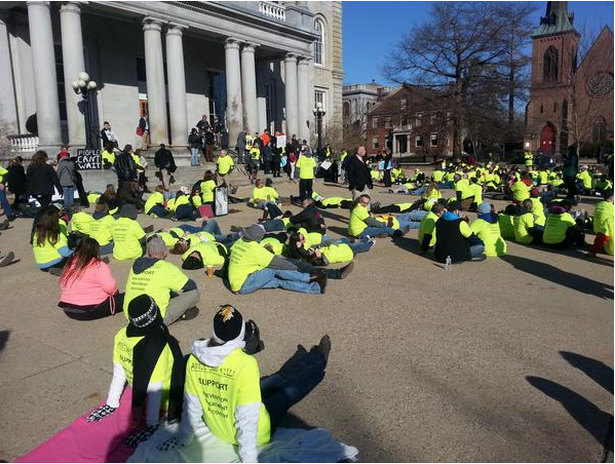
CONCORD, NH – House Bill 270, also referred to as the “Good Samaritan” bill, was been approved unanimously by the New Hampshire Senate on June 4 and will become effective 60 days from passage.
The bill is considered a companion bill to HB 271, the Narcan bill, which passed earlier this week.
HB 270 allows for an individual to call 911 for medical help in the event of a drug overdose without fear of arrest, prosecution, or conviction for the crime of possession of the controlled drug. The protection extends to alcohol overdoses, with the intention of relieving fear of arrest in an underage drinking situation. It does not extend immunity to someone dealing drugs or providing alcohol to minors.
Prime sponsor of the bill, State Rep. Amanda Bouldin, D-Manchester, said when she was working out the original bill six months ago, she almost gave up.
“The deadline was closing in and I was busy with some other things at the time, and I almost gave up on it,” said Bouldin on Thursday, after the bill had passed. “But I knew I had to get it in.”
It was on a short list of bills that Bouldin was interested in sponsoring, and she knew that the same kind of bill had failed a few years ago, primarily because of the language.
Given the current drug epidemic plaguing the state, Bouldin says its a bill whose time has come. But she is disappointed that it has an expiration date.
“I am disappointed in the sunset amendment, which to my understanding, will automatically repeal the bill in three years,” said Bouldin. “I think it should be policy all the time. If someone is afraid of being arrested and if it results in them not seeking help then they’re being victimized by the law, and the purpose of drug laws is to promote public safety. If we’re not accomplishing that because people are avoiding calling for medical help because they know police will show up, then its going in the wrong direction.”
The amendment allows for the “immunity from liability” under 318-B:28-b to be repealed as of Sept. 1,2018.
When asked why she thought the amendment was added, Bouldin said, “welcome to politics.”
Bouldin commended fellow bill co-sponsors Manchester State Reps. Christopher Herbert and Elizabeth Edwards, and State Rep. J.R. Hoell, R-Dunbarton.
“This was a big deal for all the co-sponsors. Liz Edwards has her heart and soul in this bill. When it passed I was in my car trying to get there, and she ran down the stairs yelling ‘it passed, it passed,’ and hugged me. Chris is passionate about the war on drugs and has seen so many past failures, and JR Hoell, who signed on as a sponsor at the last minute, told me he used to work at a rehab, and that he felt it was an important bill,” Bouldin said.
But the biggest props from Bouldin go to Concord Democrats Sens. Sharon Carson and Molly Kelly.
“I’ve got to give it up to Sen. Carson – she listened to the data and arguments in committee. The trouble with the bill in the past was that it was worded with a lot of unintended consequences and that meant a lot of work for the senate committee. Sen. Carson did the work necessary to craft a bill that would accomplish its intended purpose, both Sen. Carson and Sen. Kelly. The bill wouldn’t have gotten this far without them,” Bouldin said.
John Burns of Somersworth is also thrilled. He runs a family support group, Families Hoping and Coping, which meets in Dover and Somersworth. He also has 22 years in long-term recovery, having overdosed himself as a teen. And last March, his teenage daughter overdosed – and was revived with Narcan by EMS. She is now seven months into her own recovery journey.
“So yes, the Narcan and Good Samaritan legislation are near and dear to my heart,” said Burns. “No one recovers when they’re dead, that I know for sure. The Good Samaritan, to me, is the critical piece because the reality is, most people in active addiction are not thinking rationally. They’re scared of being arrested.”
Burns said he went on from his own addiction to complete his MBA and raise a family. He knows, first hand, that there is life after addiction, and hope for those who are currently battling through.
“I shouldn’t be here but I am,” said Burns.
He has been floored by much of the negative feedback circulating on social media over the two new laws.
“There are still a lot of people out there who don’t understand addiction or its challenges, or that it’s a progressive illness. At the moment someone chooses to do heroin, they’re beyond making a healthy choice,” says Burns. “And I’m 100 percent certain the problem will get worse before it gets better.”
He says New Hampshire still has a long way to go, but it’s time to put partisan politics aside and work toward more prevention, treatment and recovery here.
“New Hampshire remains 49th out of 50 states for recovery options. We’re still not fully funding the Alcohol Fund, which was earmarked by legislation for this,” says Burns. “Addiction is impacting rich families and poor families. Addictiion doesn’t care if you’re a Republican or a Democrat. They’re worried in Concord about not being able to afford to spend money on this. Frankly, they can’t afford not to.”

You’re one click away! Sign up for our free eNewsletter and never miss another thing







